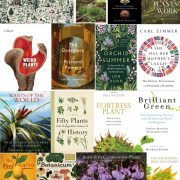Interview with Dr Brian Larkins – Maize Kernel Development book and career advice
Listen to an interview with Dr. Brian Larkins
In this interview, Kevin Folta interviewed Dr Brian Larkins, former ASPB President about his new book, Maize Kernel Development. Dr Larkins talks about the story behind the book, its uniqueness, his research with maize and in the last section, he shares some career advice to both students and established scientists.
DOWNLOAD THE AUDIO INTERVIEW HERE
The main motivation for this book was to collect the most important questions and what we do not know rather than a textbook on what we do know. This idea came to him when he was giving a seminar in China and he was asked phenomenal questions by students. The interviewer summarises the book as guide for ‘Here are the buckets to be filled!’.
He estimates 500-1,000 citations within the book so it also a great resource for academic and students. More importantly, this research is valuable for scientists working with different crops, such as cereals, rice and sorghum.
Have a peak in the book via Google Books: https://books.google.co.uk/boo…
You can purchase the book from CABI: https://www.cabi.org/bookshop/…
And you can download the Kindle edition from Amazon: https://www.amazon.com/dp/B078…
Dr Brian Larkins – Background
Dr Larkins received his BSc and PhD (1974) from University of Nebraska-Lincoln, spent 12 years at Purdue University before becoming the Head of Plant Sciences at the University of Arizona in 1988. At Aizona he was a Regents Professor, held the Proterfield Chair in Plant Sciences. He received a number of awards, including the Charles A. Shull (1983), Dennis R. Hoagland (1997), and Stephen Hales Prize (2013) from the ASPB, and is a former Editor-in-Chief of The Plant Cell.
He received the UNL’s Alumni Achievement Award (1996), was recognized as a Notable Alumnus of Teachers College (1988) and he is a member of the National Academy of Sciences (1996). He is a Fellow of ASPB and AAAS (2007) and the National Academy of Inventors (2013).
Throughout his academic career, he has thought molecular and cellular biology. His research for over 40 years focused on the influence of starch and proteins on the nutritional quality, digestibility and texture of corn.
His articles include ‘A structural model for maize zein proteins’ (1982), ‘Protein storage bodies and vacuoles (1999), ‘A maize cDNA encoding a member of the retinoblastoma protein family: involvement in endoreduplication’ (1996) and ‘Investigating the hows and whys of DNA endoreduplication’ (2001). You can read more of his publications on Google Scholar.
During the interview he talks about his research mentioned above and how they approached different questions.

Career advice by Dr Larkins
‘One of my recommendations to young associate professors to teach introductory biology’ he says. No constant revision is needed but the interaction with students, and following the students’ educational path is a rewarding experience.
As a senior scientist, it is important to be curious, read broadly, and to be comfortable with your level of ignorance. ‘Don’t be the smartest person in your lab’ that limits one’s ability to grow.
For students, he emphasizes the need for skills in maths, statistics, and computational skills. He recommends:
– Be a specialist but a generalist too.
– You begin with asking a question and you will end up working on things you never thought you’d be working on at the start.
– Think seriously what you are getting yourself into – it’s all about discovery and constant learning.
– The day you get your PhD, is the day when you get a license to go out and earn money
– Enjoy the rewards of the job – travelling around the world, teaching, discovering but be aware of the sacrifices that are required in exchange.
– Your major professor will have larger impact on your life than your parents – select the people you want to work with.

Have a peak in the book via Google Books: https://books.google.co.uk/boo…
You can purchase the book from CABI: https://www.cabi.org/bookshop/…
And download the Kindle Edition from Amazon: https://www.amazon.com/dp/B078…







